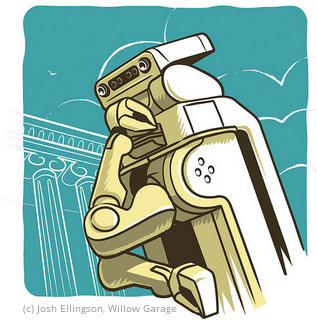
|
 |

IROS 2013 Workshop: AI-based Robotics
 Over the past years, research in Artificial Intelligence has made significant
progress in mining knowledge from the web, aggregating information from
different sources and using this knowledge to answer complex queries. Watson's
victory over human jeopardy players impressively showed that very complex
tasks in terms of knowledge acquisition, question answering, and natural
language understanding can nowadays be solved. Systems like Apple's SIRI or
Google now can understand commands based on the user's location, daily
schedule and recent communication.
Over the past years, research in Artificial Intelligence has made significant
progress in mining knowledge from the web, aggregating information from
different sources and using this knowledge to answer complex queries. Watson's
victory over human jeopardy players impressively showed that very complex
tasks in terms of knowledge acquisition, question answering, and natural
language understanding can nowadays be solved. Systems like Apple's SIRI or
Google now can understand commands based on the user's location, daily
schedule and recent communication.
So far, such technology has not been applied much in robotics. Recently,
however, we have seen a strong trend towards using semantic information in
robotics, for instance in form of semantic maps, and believe that having
access to AI methods will be crucial for robots to become intelligent
co-workers and skilled household assistants.
In the past year, there have been several efforts from both the AI and
robotics community to bring these research areas closer together: The AAAI
Spring Symposia 2012 and 2013 on "Designing Intelligent Robots: Re-integrating AI" assembled researchers from the AI community, the "AI meets Robotics" workshop series provided a forum mainly for European researchers. With this workshop during the IROS 2013 conference, we would like to make the robotics community aware of the state of the art in this area, to examine how AI methods can help robots in performing their tasks, and identify major research challenges that need to be addressed.
List of Topics
Knowledge representation for robots: Which kinds of knowledge are required? Which representation formalisms are suitable for being used on autonomous robots? Which aspects (e.g. spatio-temporal reasoning, changes in objects and the environment over time) need to be modeled, and how can they be expressed in the chosen formalism?
Grounding and anchoring: Practical methods for grounding abstract symbols in percepts and actions, including the selection of the right object to be used for a task among multiple alternatives.
Hybrid Reasoning: AI methods typically focus on discrete, symbolic knowledge, but a robot also needs to reason about continuous, non-symbolic entities like time, geometry, and resources. How should the two types of reasoning be combined? Examples include hybrid task and motion planning, and combined planning and scheduling.
Task- and motion planning and execution: Planning and executing complex tasks requires the combination of symbolic task-level planning with methods for planning and executing continuous motions. How can motions be parameterized considering the robot's background knowledge? How can the task-level executive gain deeper understanding of the goals and effects of lower-level motions?
Experience-based learning: Robots will operate over an extended period of time, repeatedly performing similar tasks. How can they accumulate semantically annotated experiences, and how can they extract generalizable knowledge from them? Can approaches like ``big data AI'' be applied to robot experiences to extract useful information for future tasks?
Knowledge acquisition: How to acquire the large amounts of knowledge required to competently act in human environments? Can web resources be exploited to help robots with knowledge acquisition?
Semantic Maps: Environment maps that provide robots with semantic information have become an important research topic in robotics. How can these maps benefit from AI methods? How can they be extended to provide deeper information than just positions of objects?
System-level AI for robotics: Which frameworks, representations and reasoning techniques can be applied for large-scale applications in robotics?
Workshop program and venue
Invited speakers
Minoru Asada (Osaka University, Japan)
Michael Beetz (University of Bremen, Germany)
Kei Okada (University of Tokyo, Japan)
Federico Pecora (Örebro University, Sweden)
Ashutosh Saxena (Cornell University, USA)
Call for papers
We invite papers of 6 pages in the standard IROS conference format. Submissions should describe clearly the problems to which AI techniques are applied, explain the methods that are used, and give an outlook on challenges that need to be solved in the future.
Besides technical quality and relevance to the workshop topics, the submissions will be judged by their novelty, their potential to generate discussion, and their ability to foster collaboration within the community.
Submissions and questions should be directed to iros-ws@robohow.eu
Important dates (Deadlines extended)
Submission of full-length papers: September 8th, 2013 (midnight PST)
Notification of acceptance: October 1st, 2013
Final paper submission: October 15th, 2013
Workshop at Tokyo Big Sight, Japan: Thursday, November 7th, 2013
Organizers
Moritz Tenorth, Institute for Artificial Intelligence, Universität Bremen
Odest Chadwicke Jenkins, Department of Computer Science, Brown University
Alessandro Saffiotti, School of Science and Technology, Örebro University, Sweden
Michael Beetz, Institute for Artificial Intelligence, Universität Bremen
|
 |